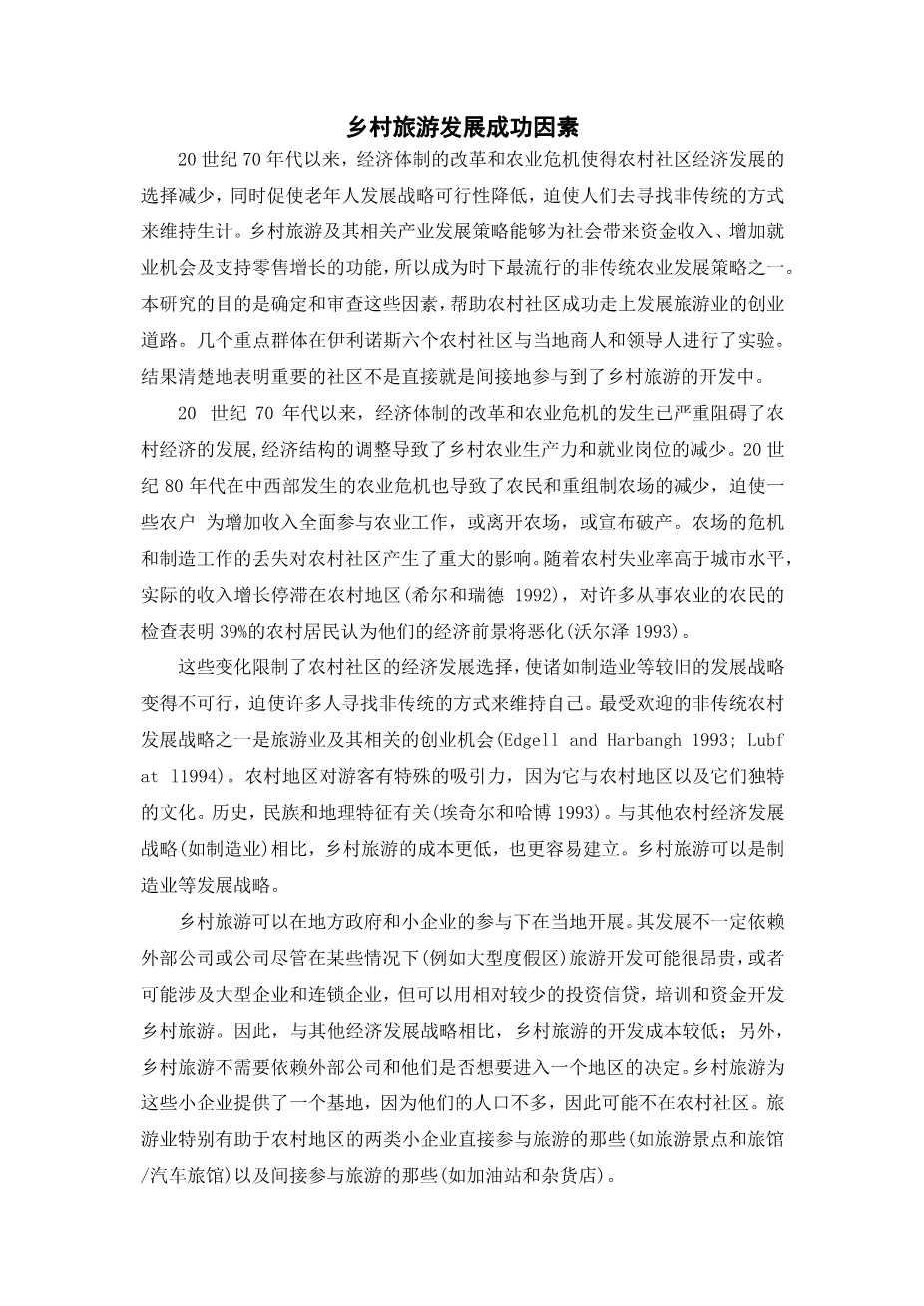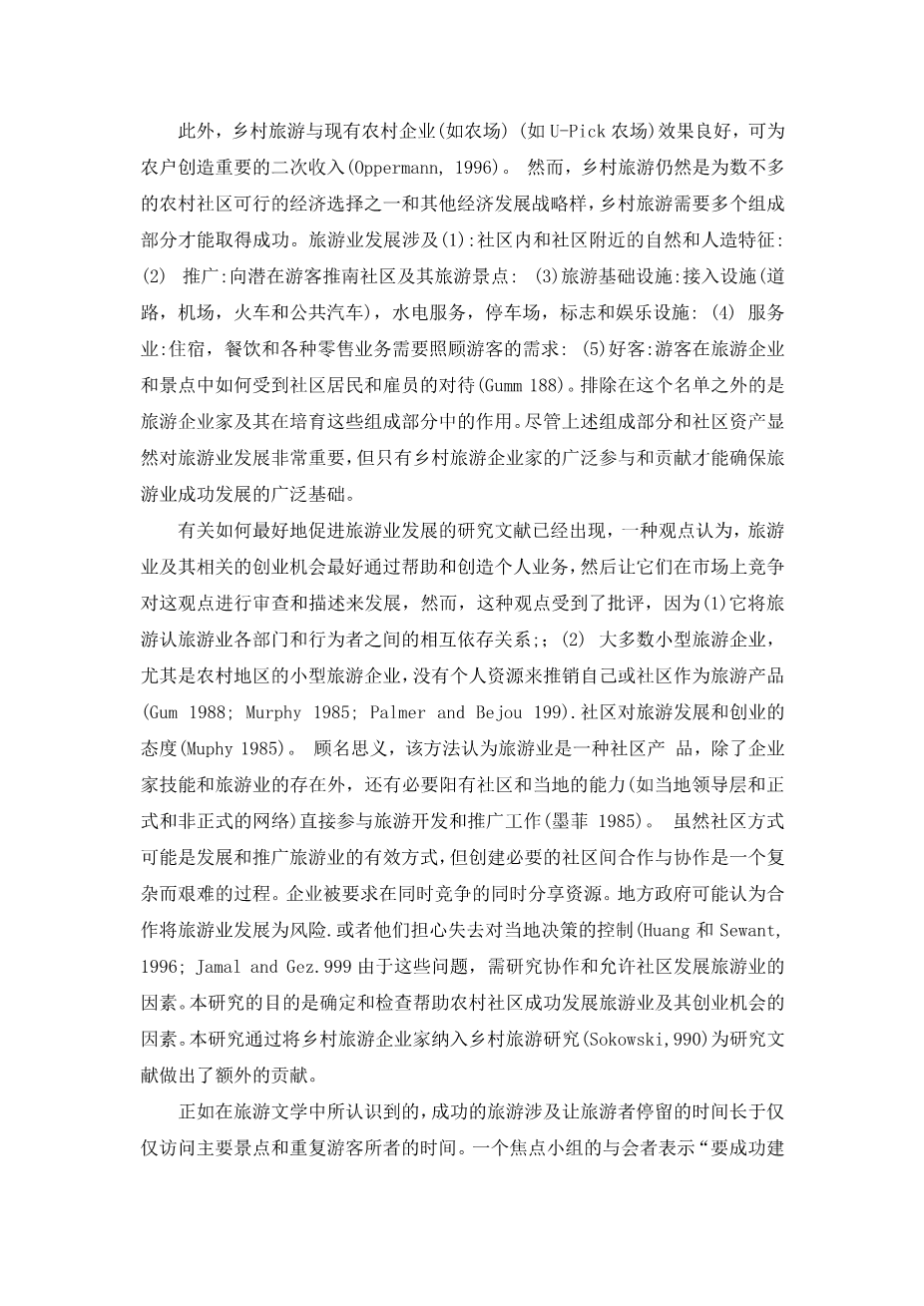Factors for success in rural tourism tourism development
Since the 1970s, economic restructuring and farm crisis have reduced rural communities economic development options, making older development strategies less viable and forcing many to look for nontraditional ways to sustain themselves. One of the most popular nontraditional rural development strategies has been tourism and is associated entrepreneurship rural development strategies has been tourism and its associated entrepreneurship opportunities because of tourisms ability to bring in dollars and to generate jobs and support retail growth. The purpose of this study was to identify and examine those factors that have helped rural communities successfully develop tourism and its entrepreneurship opportunities. Several focus groups were conducted with local businesspersons and leaders in six rural Illinois communities. The results clearly demonstrate the importance of the community approach to tourism development and that rural tourism development and entrepreneurship cannot work without the participation and collaboration of business persons directly and indirectly involved in tourism
Since the 1970s, economic restructuring and the farm crisis have severely reduced rural communitiesrsquo; economic opportunities. Economic restructuring has caused a loss of rural manufacturing plants and many jobs. The 1980s farm crisis in the Midwest also led to a decline in the numbers of farmers and restructured farm ownership, forcing some farm families to augment their incomes with off-farm jobs, to depart farming, or to declare bankruptcy. The farm crisis and the loss of manufacturing jobs had substantial ripple eft in rural communities. As rural joblessness rates rose above urban levels, real income growth stagnated rural areas (Sears and Reid 1992). Many stores and agribusiness disappeared from small rural towns. Not surprisingly, a 1992statewid survey in Illinois found that 39% of rural res idents perceived the economic prospects as worsening (Walzer 1993).
These changes limited rural communities economic development options, making older development strategies such as manufacturing les viable and forcing many to look for nontraditional ways to sustain themselves . One of the most popular nontraditional rural development strategies has been tourism and its associated entrepreneurship opportunities (Edgell and Harbaugh 1993; Luloff et al. 1994). Rural areas have a special appeal to tourists because of the mystique associated with rural areas and their distinct cultural, historic, ethnic, and geographic characteristics (Edgell and Harbaugh 1993). Rural tourism abo is less costly and easier to establish than other rural economic development strategies such as manufacturing Rural tourism can be development strategies such as manufacturing Rural tourism can be developed locally with participation from local government and small businesses, and its development is not necessarily dependent on outside firms or companies.
Although tourism can be expensive to develop in certain cases (e.g., large resort areas) or can involve barge firms and chains, rural tourism can be developed with relatively it investment credit, training and capital Hence, rural tourism can be less costly to develop as compared to other economic development strategies; additionally, rural tourism need not involve dependency on outside firms and her dictions on whether they want to be in an arca Rural tourism provides a base for these small businesses that might not otherwise be in rural communities because of their small populations. Tourism particularly helps two types of small businesses in rural areas- those directly involved in tourism (e.g., attractions and hotels/motels) and those indirectly involved in tourism (e.g. gas stations and grocery stores).
Additionally rural tourism works well with existing rural enterprises such a firms (e.g., U-Pick fam) and can generate important secondary income for farm households (Oppermann 1996) Nonetheless, rural tourism remains one of the few viable economic options for rural communities Like other economic development strategies, rural tourism requires several components to be successful Tourism development involves(1) attractions: the natural and manmade features both within and adjacent to a community, (2) promotion: the marketing of a community and is tourism attractions to potential tourists;(3) tourism infrastructure: access facilities (roads, airports, trains, and buses),water and power services, parking, signs, and recreation facilities; (4) services: lodging, restaurants, and the various retail businesses needed to take care of tourists needs; (5) hospitality: how tourists are treated by both community residents and employees in tourism businesses and attractions (Gunn 1988). Left out of this list are tourism entrepreneurs and their role community S assets are clearly important to tourism development, only the widespread participation and contribution of rural tourism entrepreneurs can ensure a broad-based foundation for successful tourism development. A research literature has emerged on how to best facilitate the development of tourism. One view, drawing heavily on the economic literature, argues that tourism and its associated entrepreneurship opportunities are best developed by helping and creating individuals businesses and then letting them compete in the marketplace for a review and description of this view,. This view, however, has been critiqued because (1) it views tourism and tourism-related business as isolated from the larger community and its issues:(2) it does not recognize the interdependence of the various sectors and actors involved in tourism; and (3)most small tourism buses especially those in rural areas, do not have the individual resources to promote either themselves or the community as a tourist produet (Gunn 1988; Murphy 1985; Palmer and Bejou 19,0pposin
剩余内容已隐藏,支付完成后下载完整资料


英语译文共 3 页,剩余内容已隐藏,支付完成后下载完整资料
资料编号:[410173],资料为PDF文档或Word文档,PDF文档可免费转换为Word
以上是毕业论文外文翻译,课题毕业论文、任务书、文献综述、开题报告、程序设计、图纸设计等资料可联系客服协助查找。
您可能感兴趣的文章
- COVID-19时期的旅游业和可持续发展:以西班牙为例外文翻译资料
- 农民相对剥夺感对乡村旅游可持续发展的影响机制外文翻译资料
- 校园大学生的旅行行为——以亚洲某乡村大学为例外文翻译资料
- 内容旅游与地方社区响应:鹫宫的“幸运之星”和“协作动漫旅游”外文翻译资料
- 基于符号互动理论的遗产旅游资源开发与重塑——以良渚古城遗址为例外文翻译资料
- 在TikTok上映射互联网名人:探索注意力、经济和可见性劳动力外文翻译资料
- 基于社区游客视角的环境责任行为的概念和度量外文翻译资料
- 温泉小镇的再造:维希的独特案例——副标题外文翻译资料
- 基于IP理念的桐乡丰子恺文化旅游开发研究外文翻译资料
- 特殊事件对旅游业的影响及其应对措施研究——新冠肺炎疫情对全球旅游业的影响及其应对措施外文翻译资料


